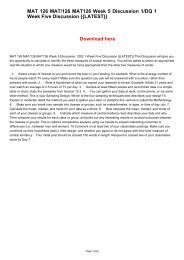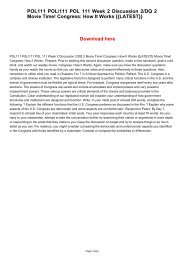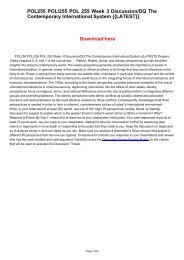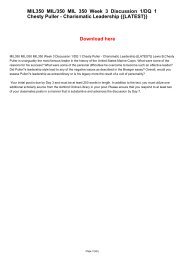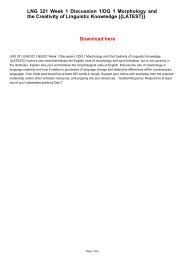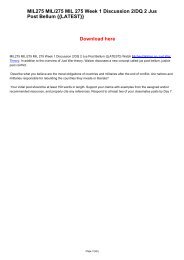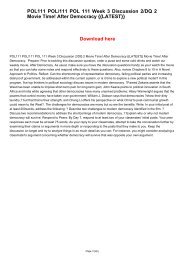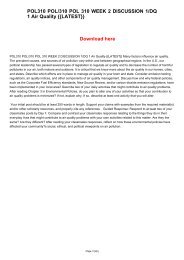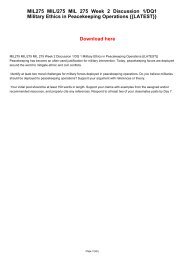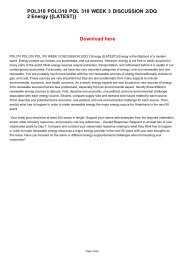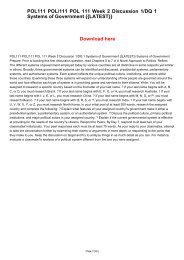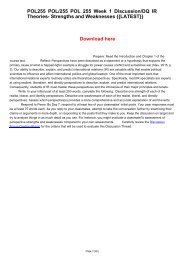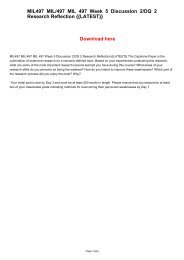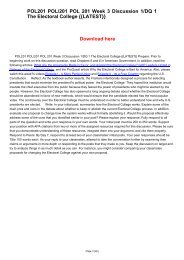POL255 POL255 POL 255 Week 2 DiscussionDQ Communicating National Interests {{LATEST}}
You also want an ePaper? Increase the reach of your titles
YUMPU automatically turns print PDFs into web optimized ePapers that Google loves.
<strong><strong>POL</strong><strong>255</strong></strong> <strong>POL</strong>/<strong>255</strong> <strong>POL</strong> <strong>255</strong> <strong>Week</strong> 2 Discussion/DQ<br />
<strong>Communicating</strong> <strong>National</strong> <strong>Interests</strong> {{<strong>LATEST</strong>}}<br />
Download here<br />
<strong><strong>POL</strong><strong>255</strong></strong> <strong>POL</strong>/<strong>255</strong> <strong>POL</strong> <strong>255</strong> <strong>Week</strong> 2 Discussion/DQ <strong>Communicating</strong> <strong>National</strong> <strong>Interests</strong> {{<strong>LATEST</strong>}} Prepare: Read<br />
Chapters 2, 3, and 4 of the course text. Reflect: Effective and timely communications among international actors is<br />
essential for a peaceful and predictable international environment. History is replete with examples of both effective,<br />
timely communications and ineffective, poorly timed communications between international actors. Effective, timely<br />
communications enables actors to share interests, to establish constructive and collaborative relationships, and to<br />
maintain stable and progressive foreign affairs. Ineffective, inopportune communications can result in conflict, reduce<br />
cooperation, and increase stress and fear among international actors. International disputes, diplomatic incidents, and<br />
even wars, have resulted from ineffective, inopportune communications. Success and failure can often be attributed to<br />
similar or contrasting theoretical perspectives on how to conduct foreign affairs. Therefore, a more in-depth<br />
understanding of how communications are sent, received, and interpreted is needed in order to understand global<br />
politics. Write: In your initial post of at least 200 words, complete only the portions you are assigned: If your last name<br />
begins with A - M, you must complete the following: Identify, from the course text readings on World War I, World War<br />
II, and the Cold War, one example from each conflict of effective, timely communications of national interests between<br />
international actors. Explain what factor(s) made the communications effective and timely. If your last name begins with<br />
N - Z, you must complete the following: Identify, from the course text readings on World War I, World War II, and the<br />
Cold War, one example from each conflict of ineffective, poorly timed communications of national interests between<br />
international actors. Explain what factor(s) made the communications ineffective and poorly timed. Respond to<br />
Peers: By Day 7, respond to at least two of your classmates' initial posts. Your peer responses must be at least 75<br />
words each. As you reply to your classmates, attempt to take the conversation further by examining their claims or<br />
arguments in more depth or responding to the posts that they make to you. Keep the discussion on target and try to<br />
analyze things in as much detail as you can. If your last name begins with A - M, respond to someone whose last name<br />
begins with N - Z. If your last name begins with N - Z, respond to someone whose last name begins with A - M. For<br />
example, discuss the similarities or differences between the main factors that contributed to the effectiveness and the<br />
main factors that contributed to the ineffectiveness of the communications. Carefully review the Discussion Forum<br />
Grading Rubric for the criteria that will be used to evaluate this Discussion Thread.<br />
Page 1/{nb}



